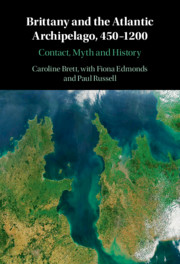Book contents
- Brittany and the Atlantic Archipelago, 450–1200
- Brittany and the Atlantic Archipelago, 450–1200
- Copyright page
- Contents
- Maps
- Tables
- Preface and Acknowledgements
- Abbreviations
- Additional material
- Introduction
- 1 Archaeology and the Origins of Brittany
- 2 Settlement and Isolation, 450–800
- 3 Brittany and Its Insular Past in the Ninth Century
- 4 Insular Contact and the Manuscript-Culture of Brittany in the Ninth and Tenth Centuries
- 5 From Invasion to Conquest: Brittany and Its History, 919–1066
- 6 Saints and Seaways: The Cult of Saints in Brittany and Its Archipelagic Links
- 7 Bretons and Britons in the Norman and Angevin Empires, 1066–1203
- Conclusion
- Bibliography
- Index
3 - Brittany and Its Insular Past in the Ninth Century
Published online by Cambridge University Press: 21 October 2021
- Brittany and the Atlantic Archipelago, 450–1200
- Brittany and the Atlantic Archipelago, 450–1200
- Copyright page
- Contents
- Maps
- Tables
- Preface and Acknowledgements
- Abbreviations
- Additional material
- Introduction
- 1 Archaeology and the Origins of Brittany
- 2 Settlement and Isolation, 450–800
- 3 Brittany and Its Insular Past in the Ninth Century
- 4 Insular Contact and the Manuscript-Culture of Brittany in the Ninth and Tenth Centuries
- 5 From Invasion to Conquest: Brittany and Its History, 919–1066
- 6 Saints and Seaways: The Cult of Saints in Brittany and Its Archipelagic Links
- 7 Bretons and Britons in the Norman and Angevin Empires, 1066–1203
- Conclusion
- Bibliography
- Index
Summary
In the ninth century, the Carolingian conquest of Brittany, together with a Europe-wide revival of learning, created a new interest in explaining Brittany’s past. Rival stories of Brittany’s British origins were set down by Frankish, Welsh and Breton scholars. The Bretons’ view of their own past was expressed wholly through the medium of hagiography, a considerable amount of which was produced during the later ninth and early tenth centuries: this allows us to gauge the nature of its authors’ links with the Insular world. The British origins of the founding figures of the Breton Church were proudly proclaimed despite a readiness to accept Carolingian authority; there seems to have been little real knowledge of the saints’ alleged sixth-century origins, but considerable opportunity to gather information contemporaneously from Wales and perhaps also from Cornwall and Ireland. The role of Llancarfan (in south Wales) in relaying information between Ireland and the hagiographers of Saint-Malo in Brittany is highlighted.
- Type
- Chapter
- Information
- Brittany and the Atlantic Archipelago, 450–1200 , pp. 100 - 142Publisher: Cambridge University PressPrint publication year: 2021

